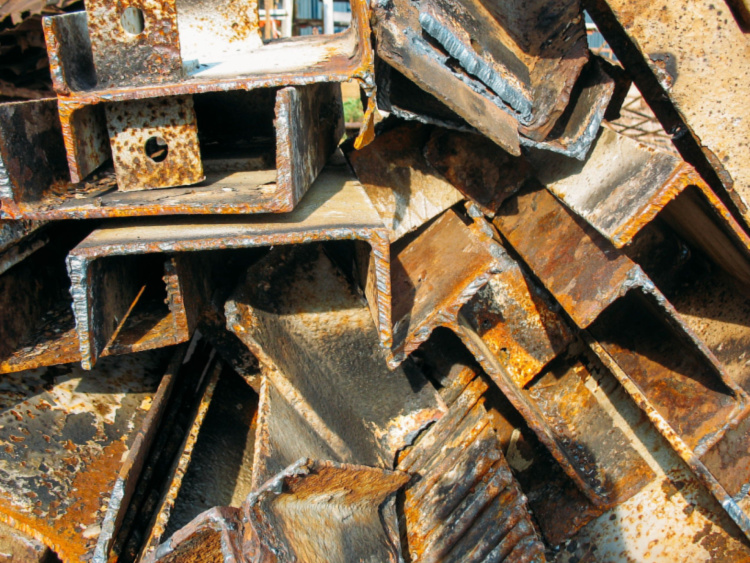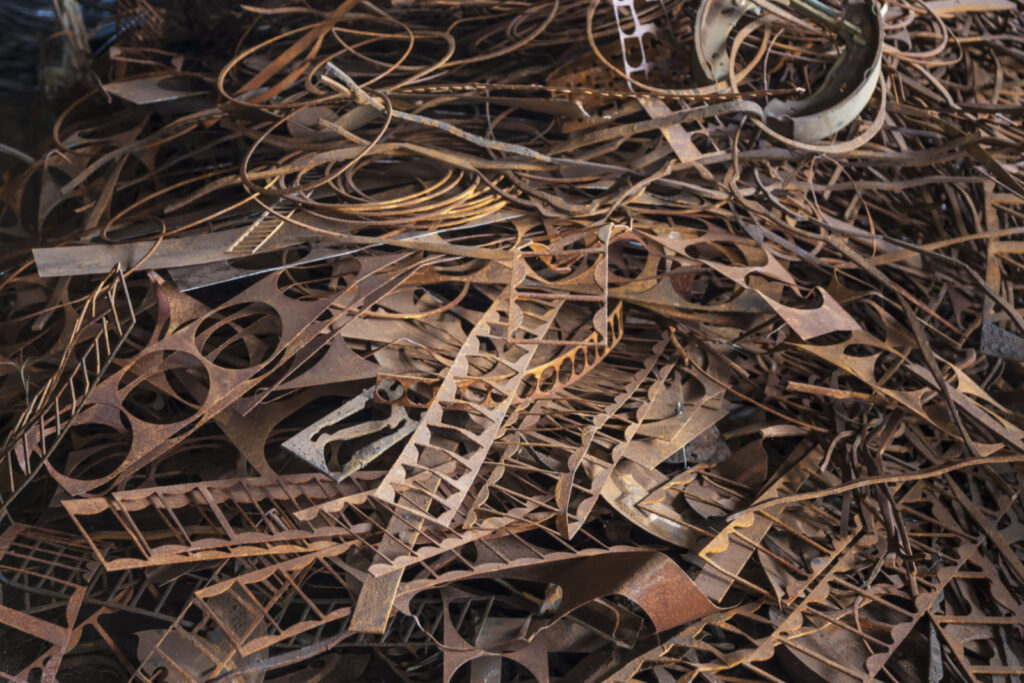Many metals are recyclable, but what happens if your scrap becomes rusted? Materials made from iron can look a little rough if exposed to the elements too long. Is rusted metal still scrapable, or is it too damaged?
Continue reading to learn more about rusted metal, including how it forms and if it’s still recyclable.
What Metals Are Recyclable?
Almost everyone has heard the classic slogan “reduce, reuse, recycle,” and metal is one of the most recyclable materials. Recycling metal is especially beneficial because you can do it repeatedly without affecting its quality. Metal can be scrapped, melted down, reused, and brought back to go through this process again and again.
When it comes to metal, many types of it are recyclable. You’ll find 2 common types of metals when you’re looking to recycle them: ferrous and non-ferrous metals. If you’re looking for an easier way to remember these types of metal, you can categorize them as magnetic and non-magnetic.
Ferrous metals primarily consist of iron and are known for being durable and strong. You’ll find these metals in many everyday items and buildings.
Some commonly recycled ferrous metals include:
- Structural steel
- Angle products
- Channel pieces
- Hollow structural section steel
- Plates (metal flattened into sheets)
- Metal beams
Non-ferrous metals aren’t magnetic because they don’t have a lot of iron in them. These materials are more workable, meaning you can shape and hammer these metals without breaking them. You’ll find non-ferrous metals in many electrical and electronic appliances and products.
You can recycle the following non-ferrous metals:
- Aluminum
- Brass
- Copper
- Insulated wire
- Nickel alloys
- Stainless steel
- Carbide/tungsten carbide
What About Rusted Metal?
You can help the environment (and your wallet) by recycling metal, but what happens if your metal isn’t as pristine as it could be? Is metal still recyclable if you have old, rusted metal that’s sat outside too long?
Before we answer this question, let’s look at how rust forms.
How Does Rust Form?
Rust is a nickname for a compound known as iron oxide. Iron needs 3 things to become rusted: iron, water, and oxygen.
Rust forms because iron combines with oxygen. When something rusts, it’s a form of corrosion, which occurs when the metal in an object receives oxygen from a liquid (like water). As this process occurs, metal leaves the object, creating rust.
Not every metal can rust—only metals containing iron can. However, other metals can corrode similarly to rust. If you’re looking for material that won’t rust after some summer storms, stainless steel, aluminum, and galvanized steel are your best options.

Can You Scrap Rusted Metal?
You don’t need to leave your scrap metal in a landfill if it has rust—rusted metal is still recyclable! Smelting metal breaks any bonds during the recycling process. Rust is removed during purification when it’s recycled.
Purification helps ensure scrap metal is high-quality once it’s reformed by removing contaminants. Think of rust as a removable impurity of metal. After purifying rusted scrap metal, it ends up in the same place as non-rusted metal, ingots ready to be formed into new products.
While recycling facilities still accept rusted metal, your payday may not be as lucrative. It’s common for scrap dealers to pay for scrap by weight, and severe rust damage can cause the metal to weigh less. Because of its weight and quality, you may make less money for rusted metal, but it’s still worth recycling.
Are There Metal Products You Can’t Recycle?
Many metals are recyclable, but are there any products you can’t recycle?
Unfortunately, there are products that recycling centres cannot accept as per Alberta Environmental Regulations and Mill Requirements and Standards. If you’re looking to recycle your scrap metal, it’s beneficial to know what is and isn’t accepted.
While you don’t need to know these items by heart, double-check the website of the company you’re planning to visit and save yourself the headache of lugging scrap metal home.
Prohibited Materials
If you’re looking to recycle your scrap metal, avoid bringing these items with you, such as:
- Dirt
- Concrete
- Household trash
- Rubber
- Rubber tires
- Glass
- Wood
- Insulated items
- Gas
- Diesel
- Oil
- Hydraulic oil
- Water
- Hydraulic cylinders
- Sulphured material
- Rebar, steel cable, banding, barbed wire (acceptable if chipped or cut to 6–8 inch pieces)
- Fridges
- Freezers
- Microwaves
- TVs
- Stereos
- Phones
- Computers
- Monitors
- Keyboards
- Capacitors
- Ballasts
- Micro switches
- Aerosol cans
- Propane tanks
- Sealed or squashed drums
- Sealed containers or tanks
- Cans or containers that contain or did contain paint, sealers, pesticides, or other toxic chemicals
Bring Your Scrap, Rusted or Not
You don’t need to worry about rusted metal—it’s still recyclable no matter what. As long as your items aren’t prohibited, your scrap metal is free to sell. You can always call your recycling centre first to ask questions if you’re unsure. Contact us at Federal Metals if you have scrap metal you’re looking to sell. We’re happy to take it off your hands!



